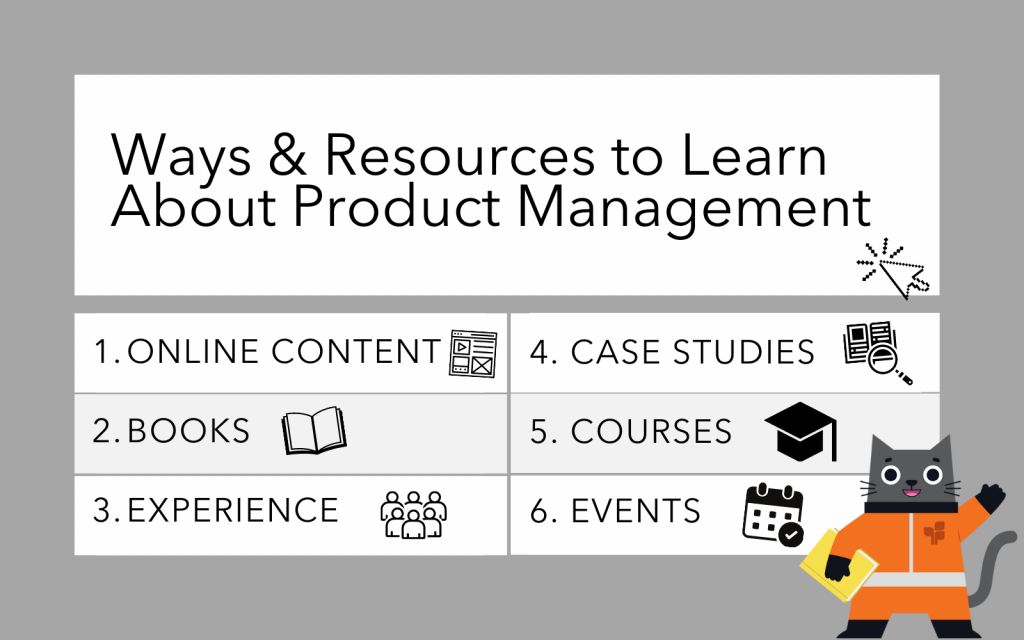
This is an overview for engineers, designers, managers, business analysts and others looking to understand more about the discipline of product management. It’s a brief guide on how to learn about product management.
The discipline of product management is something that matters to every role in an organisation whose primary means of interacting with a customer is through digital channels or digital products.
Importantly, this guide isn’t trying to tackle the topic of ‘how to be a product manager’ or ‘how to get into product management’, which are covered pretty comprehensively across the web.
This guide provides an overview of the discipline of product management and how to learn about it. It goes through the ways you can learn with resources for learning and then presents a suggested learning pathway.
You could skip straight to the end if you’re in a hurry.
Ways and Resources To Learn About Product Management
The ways you can learn about product management are:
- Online Content
- Books
- Experience
- Case Studies
- Courses
- Events
Each of these are explored in more detail below. The ordering is roughly most accessible and affordable to least.
The resources for learning listed with each way, like links to books or podcasts, are only meant to serve as examples. The list of resources is in no way comprehensive and is intended more to illustrate the type of learning material available. The resources are listed in no particular order.
If any key resources have been left off, then please don’t take it as an intentional effort to ignore it, as compiling a comprehensive list would have been too time-consuming without adding to the value of this guide. We also haven’t shared an evaluation of the resources, though we’ve tried only to include those we know to be useful and reputable. If you’d like yours added, then please contact us, and we will assess whether to add it.
Online Content
Online content is the most accessible and affordable way of learning about product management. It includes articles, podcasts, videos and webinars. Its quality varies between unique insights you can’t get elsewhere down to content spam that is actually harmful to your knowledge and will lead you the wrong way.
The key advantage is that it’s free. The disadvantage is that you can’t always be sure if it’s good, and you need to sift through a lot of it.
Here are some resources to give you a sense of what is out there.
Articles
There are so many fantastic articles out there on product management. The best way to access these is through some of the communities:
Podcasts
If you prefer to learn through audio, then there are podcasts out there to choose from:
Videos and Webinars
If you’re more visual, then these webinars and videos might be right for you:
- Pragmatic Institute’s PragmaticLive Webinars
- 280 Group’s Webinars on Product Management
- Terem’s Webinars on Product Development & Management and YouTube Channel
Many of the product tool vendors also have their own webinars, but they’re often more tool focused.
Key Thinkers
Another way to sort through online content is to follow some of the key thinkers in product:
Books
The right product management books will provide you with a more comprehensive understanding and framework to learn about product management. They’re cheaper than a course but do require you to read over a period of time.
Some books that provide a good foundation in product management are:
- Inspired
- The Four Steps to the Epiphany
- Continuous Discovery
- Lean Startup
- Hooked: How to Build Habit-Forming Products
Case Studies
Due to the nature of product management being a practical discipline, there is a lot to be learnt from case studies. These are almost like simulations of the real world that enable you to see how decisions and strategies might play out.
Here are some sources of case studies:

Experience
Experience in product management is a key part of understanding it. To really understand, you also need to see it in practice, such as seeing how situations evolve, making decisions and making mistakes.
This is accessible in that you’re probably able to get more exposure to it than you realise with what you’re currently doing (if you already work in, on or around products or technology).
It’s either the most expensive or one of the least expensive, depending on how you look at it. It’s inexpensive if you’re learning as part of your job, adding value in another area. Inexpensive for you because you’re being paid to do it, inexpensive for the business because you’re adding value elsewhere. It’s expensive in terms of time and effort. It’s expensive if you make expensive mistakes (which are kind of necessary for learning).
Simplistically, to pick up more experience in product management, spend more time with those in your organisation that have the experience and try to apply what you’re learning from the other ways of learning listed in this guide.
There is more to learning from experience, but we won’t go further into this for the purpose of this guide.
Courses
If you want something comprehensive and immersive, then a course might be a good way for you to learn about product management.
Courses start at around $35 and run all the way up to almost $10,000. There is a range of options for different budgets and learning styles. The more expensive courses provide certificates and carry the reputation of a respected provider. But, you’d be surprised at the quality of the cheapest courses.
Online
Institutions
There are educational institutions, like universities, offering product management short courses now. Here are some examples:
- Kellogg School of Management
- Stanford University – notably Stanford has a range of courses and price points around product management
- INSEAD
- MIT – this is more about innovation, but the material is relevant
- RMIT
- UC Berkeley
Training Firms
There are some specialist training firms that offer courses in product management:
There are also some general training firms offering courses in product management like General Assembly.
Conferences
Some conferences you might want to attend to hear the latest in thinking are:
More readings on Product Management:
- Three Product Management Lessons from a 4 Year Old with a Bee-bot Robot
- The 7 Categories of Product Management Tools

Scott Middleton
CEO & Founder
Scott has been involved in the launch and growth of 61+ products and has published over 120 articles and videos that have been viewed over 120,000 times. Terem’s product development and strategy arm, builds and takes clients tech products to market, while the joint venture arm focuses on building tech spinouts in partnership with market leaders.
Twitter: @scottmiddleton
LinkedIn: linkedin.com/in/scottmiddleton